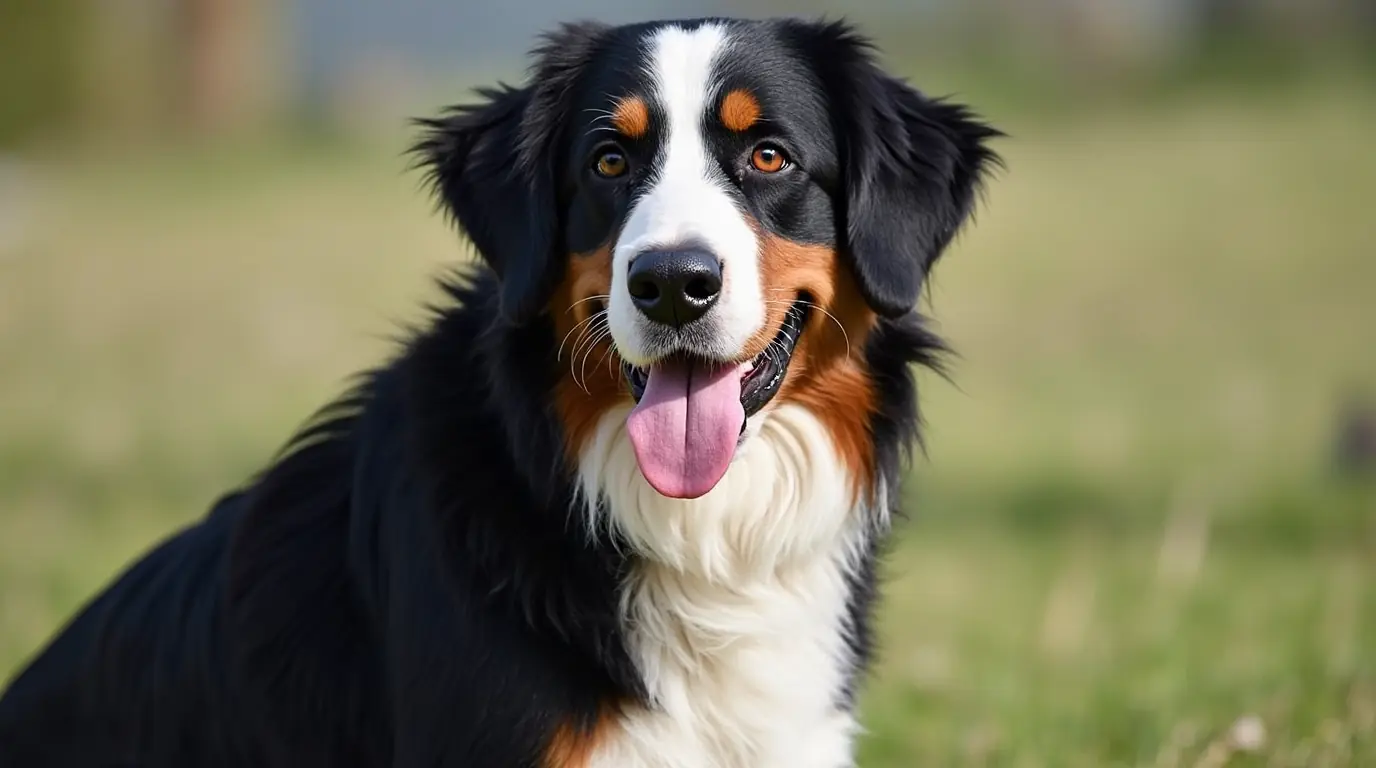Bernese Mountain Dog: The Ultimate Guide to This Gentle Giant
The Bernese Mountain Dog is a majestic, affectionate, and hardworking breed that has won the hearts of dog lovers worldwide. Known for its loyal nature, intelligence, and striking tricolor coat, this Swiss breed excels as a family companion and a working dog. In this guide, we’ll explore everything you need to know about Bernese Mountain Dogs, from their history and personality to training, health, and care requirements.
History and Origins of the Bernese Mountain Dog

The Bernese Mountain Dog hails from the Swiss Alps, where it was originally bred as a farm dog used for herding cattle, pulling carts, and guarding livestock. The breed’s ancestors date back over 2,000 years, believed to have been brought to Switzerland by Roman soldiers.
By the 19th century, industrialization reduced the need for farm dogs, leading to a decline in their population. Fortunately, breed enthusiasts worked to revive and standardize the Bernese Mountain Dog, ensuring its survival. The breed was officially recognized by the American Kennel Club (AKC) in 1937, and today, it remains a popular choice for families and working dog enthusiasts alike.
Read also: Dry Dog Nose: Causes, Symptoms, and How to Treat It
Physical Characteristics of the Bernese Mountain Dog
The Bernese Mountain Dog is large, strong, and well-built, making it an impressive yet gentle companion.

- Height: Males: 25-28 inches | Females: 23-26 inches
- Weight: Males: 80-115 pounds | Females: 70-95 pounds
- Coat: Thick, double-layered, and tricolored (black, white, and rust)
- Lifespan: 7-10 years
Their thick fur helps them withstand cold climates, making them ideal for families in cooler regions. However, they may struggle in hot and humid environments and require extra care to prevent overheating.
Personality and Temperament
One of the standout traits of the Bernese Mountain Dog is its calm and affectionate nature. This breed is known for being:
✅ Loyal and devoted – Forms strong bonds with family members
✅ Friendly and gentle – Excellent with children and other pets
✅ Intelligent and eager to please – Highly trainable
✅ Protective but not aggressive – Makes a great watchdog without unnecessary aggression
✅ Playful and affectionate – Enjoys spending time with family
While the Bernese Mountain Dog is generally good-natured, early socialization and training are essential to prevent shyness or overprotectiveness.
Training a Bernese Mountain Dog
Training a Bernese Mountain Dog is relatively easy due to their intelligence and willingness to please. However, given their large size, early training is crucial.

Training Tips:
✔️ Start early – Begin obedience training as a puppy
✔️ Use positive reinforcement – Reward good behavior with treats, praise, and toys
✔️ Be consistent – Clear commands and repetition help reinforce training
✔️ Avoid harsh corrections – They are sensitive and respond best to gentle training
✔️ Socialize early – Expose them to different people, pets, and environments
Common commands to teach your Bernese:
- Sit – Helps with impulse control
- Stay – Useful for safety
- Come – Essential for recall
- Heel – Prevents pulling on the leash
- Leave it – Stops unwanted chewing or eating
Exercise Needs
Despite their large size, Bernese Mountain Dogs are not overly hyperactive. However, they do need daily exercise to maintain their health and happiness.
🚶 Daily Walks: 30-60 minutes of walking 🎾 Playtime: Fetch, tug-of-war, or agility games 🐕🦺 Dog Sports: They excel in obedience, tracking, and cart-pulling
They enjoy hiking and outdoor activities, but they should avoid excessive exercise during hot weather due to their thick coats.
Grooming Requirements
The Bernese Mountain Dog’s thick coat requires regular maintenance to keep it clean and healthy.
🖌️ Brushing: 2-3 times per week to remove loose hair 🛁 Bathing: Every 4-6 weeks or as needed ✂️ Shedding: Heavy shedding occurs in spring and fall 🐾 Nail trimming: Every 3-4 weeks 👂 Ear cleaning: Weekly to prevent infections
They are known to drool occasionally, so be prepared to wipe their mouths when needed.
Diet and Nutrition
Your dog’s health is at stake, so make sure he or she has access to fresh water and a nutritious meal. Large-breed diets are very beneficial for a Bernese puppy. In order to avoid joint and other health problems, these diets provide the correct nourishment.
A well-balanced diet is essential to keep a Bernese Mountain Dog healthy and active.
🥩 Protein: High-quality sources like chicken, beef, or fish 🥦 Vegetables: Carrots, spinach, and sweet potatoes for vitamins 🍚 Carbohydrates: Brown rice and oatmeal for energy 💧 Water: Always provide fresh, clean water
🔴 Avoid: Chocolate, grapes, onions, and excessive fatty foods.
Meals are usually served twice a day in most households. Make sure your dog is getting enough to eat by consulting with your veterinarian about the diet and portion size.
For your pet’s sake, keep an eye out for treats and any additional food that might lead to overeating and obesity. Dogs who are overweight are more susceptible to arthritis and other health issues because of their large size.
Common Health Issues
Bernese mountain dogs have very short lifespans compared to many other breeds, which should be considered before bringing one home. The Berner, like many other breeds, is prone to specific inherited problems, such as:
Unfortunately, Bernese Mountain Dogs have a short lifespan and are prone to several health problems, including:
❌ Hip and elbow dysplasia – Joint issues causing pain and arthritis
❌ Cancer – Higher risk than many other breeds
❌ Progressive retinal atrophy (PRA) – Eye disease leading to blindness
❌ Bloat (Gastric torsion) – A life-threatening stomach condition
❌ Von Willebrand’s Disease – A blood clotting disorder
💡 Regular veterinary check-ups and a healthy lifestyle can help prevent or manage these conditions.
Adopting a Bernese Mountain Dog
If you’re interested in adopting a Bernese Mountain Dog, consider checking reputable breeders or rescue organizations:
🏡 Bernese Mountain Dog Club of America (BMDC)
🏡 Local animal shelters and breed-specific rescues
Make sure to choose a breeder who prioritizes health testing to reduce the risk of genetic disorders.
Bernese Mountain Dog Rescue Centre
Ownership of a Berner is frequently obtained without a full grasp of what it takes. Besides the rescues we’ve featured, there are a slew more Berners looking for new homes. The national breed club or a local breed club may help you find a rescue if you don’t see one listed for your region.
Frequently Asked Questions (FAQs)
1. Are Bernese Mountain Dogs good family pets?
Yes! They are gentle, affectionate, and great with kids.
2. Can Bernese Mountain Dogs live in apartments?
Not ideal. They need space to move but can adapt if given enough exercise.
3. How much exercise do they need?
At least 30-60 minutes of moderate activity daily.
4. Do they shed a lot?
Yes, especially during seasonal changes.
5. Are Bernese Mountain Dogs aggressive?
No, they are friendly but can be protective of their families.
6. How long do they live?
Their lifespan is 7-10 years.
7. Where can I adopt one?
Check with breed rescues, shelters, or reputable breeders.
Final Thoughts
The Bernese Mountain Dog is a loyal, affectionate, and intelligent breed that thrives in loving homes. If you have the time, space, and dedication to care for their exercise, training, and grooming needs, you’ll be rewarded with an unwaveringly loyal companion. 🐶💙







